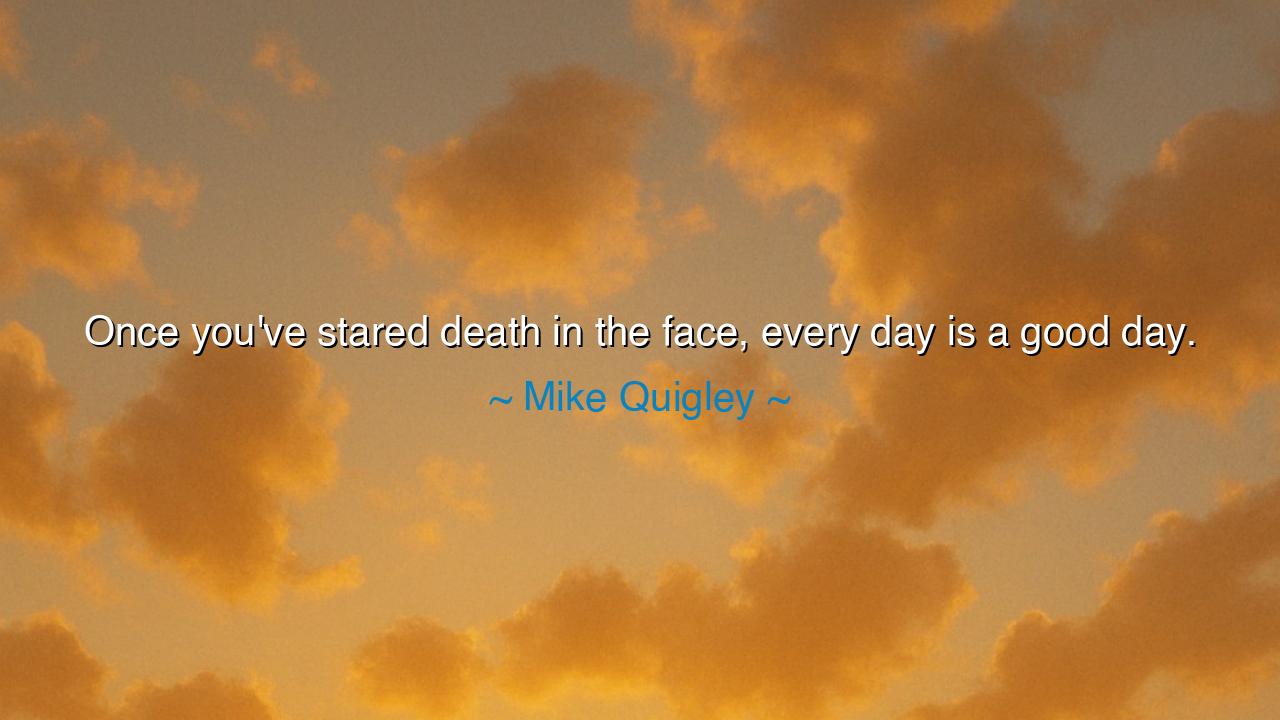
Once you've stared death in the face, every day is a good day.






The words of Mike Quigley — “Once you’ve stared death in the face, every day is a good day.” — are not the boast of a fearless man, but the revelation of one who has walked through the valley of shadows and returned with wisdom. It is a statement forged in the crucible of mortality — a truth that cannot be learned in comfort, only in confrontation with the end of all things. For when a person comes face to face with death, all illusions fall away. The noise of vanity, fear, and petty grievance is silenced, and what remains is the simple, sacred miracle of being alive. In that moment, one understands what the ancients knew well: that to truly live, one must first understand how close we stand to the edge of nonexistence.
To “stare death in the face” is to have seen the boundary between being and nothingness. It may come through illness, war, disaster, or grief — moments when the world trembles and time seems to stop. Quigley’s words echo the spirit of the Stoics of old, who taught that remembering death — memento mori — is not a morbid act, but a path to freedom. When you realize how brief and fragile your life is, you cease to waste it. Each sunrise becomes a gift; each breath becomes a prayer. The man or woman who has faced death does not merely survive — they awaken. What once seemed ordinary becomes holy: the sound of laughter, the warmth of sunlight, even the ache of living itself.
In this way, Quigley’s saying resembles the wisdom of Marcus Aurelius, the philosopher-emperor of Rome, who wrote in his Meditations: “You could leave life right now. Let that determine what you do and say and think.” Both voices, centuries apart, speak of the same awakening — that knowledge of death transforms how we see life. Those who have felt the cold breath of mortality cease to quarrel with trivial matters. They no longer chase illusions of wealth or status, for they have learned that the only treasure worth having is time, and the only power worth keeping is the peace of the present moment.
History gives us countless souls who embody this truth. Consider Nelson Mandela, who spent twenty-seven years imprisoned, never knowing if he would see freedom again. Each dawn behind those bars might have been his last. Yet when he was finally released, he walked into the world not with bitterness, but with radiant calm. He often spoke of how confinement had taught him the value of each day — how suffering had purified his spirit until every moment of freedom was a blessing. Like Quigley, Mandela had stared into the face of death — and instead of despair, he found gratitude. This is the transformation that awaits all who endure great peril: the realization that life itself, in all its imperfection, is enough.
To live in this way is to be reborn without dying. Those who have faced their mortality walk differently through the world. They do not rush, for they understand that hurry is a thief of joy. They do not hate, for they know that hatred wastes the hours that could be spent in love. They no longer measure life by its length, but by its depth. To them, each day — no matter how small, how quiet, how ordinary — becomes a celebration. For they know that the line between being and nothingness is thin, and that to wake in the morning is already a victory. This is the wisdom of the survivor, the gift of those who have looked into the abyss and chosen to cherish the light.
There is also something heroic and humbling in Quigley’s reflection. It reminds us that death, though inevitable, loses its tyranny when faced with courage. The ancients spoke of this as ataraxia — the peace that comes when the soul accepts what cannot be changed. When you have seen death and made peace with it, fear can no longer rule you. You begin to live with clarity and compassion, for you know how easily life can vanish. This understanding makes you gentler, more forgiving, and more alive than those who still believe they are immortal.
The lesson of this quote is both simple and profound: do not wait for death to teach you how to live. You need not face the battlefield, the illness, or the storm to learn this truth. Instead, remember each morning that your days are numbered, and let that knowledge give you strength. When you wake, give thanks. When you speak, speak kindly. When you love, love deeply. Treat each encounter, each meal, each breath as something sacred — for they are gifts that may not come again. In doing so, you will discover what Quigley meant: that once the fear of death fades, every day — even the hardest one — becomes a good day, because it is a day still lived, a day still full of possibility.
So carry this wisdom as the ancients carried their torches against the dark: “Once you’ve stared death in the face, every day is a good day.” Let it remind you that life, fragile though it is, is worth every struggle and every sunrise. You do not need to fear the end; you need only to honor the miracle of now. For the one who lives in the presence of death does not live less — they live more truly, more deeply, more awake to the divine wonder of being alive.






AAdministratorAdministrator
Welcome, honored guests. Please leave a comment, we will respond soon